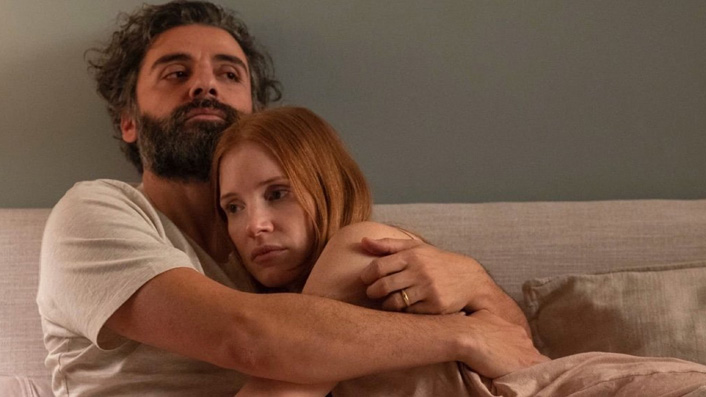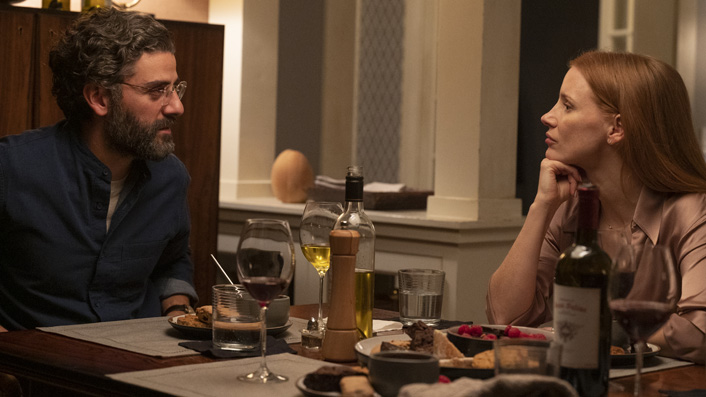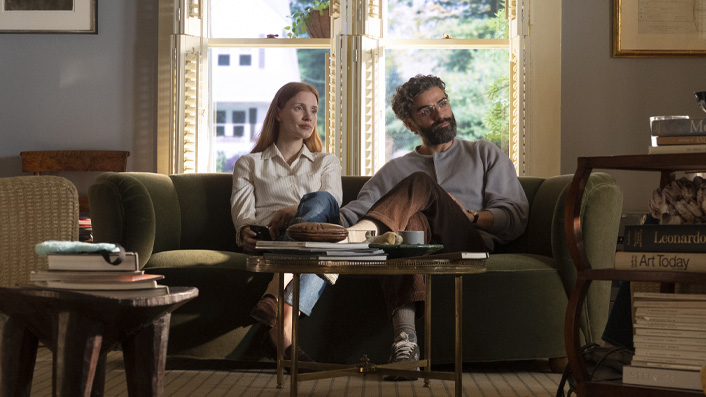Scenes from a Marriage and the electric chemistry of Jessica Chastain and Oscar Isaac

Jessica Chastain and Oscar Isaac are a couple in turmoil in Scenes from a Marriage – watch it now on Neon. While it can be difficult to get through, this is exquisitely made television, writes Amelia Berry.
The first thing we see in Scenes from a Marriage is a flurry of people in masks, escorting Jessica Chastain on set. Without even a cut, the clapper-board claps, Chastain takes out her earphones, and the show proper begins. Every episode, bar the finale, begins in a similar way, with PPE adorned crew taking stars Jessica Chastain and Oscar Isaac onto set to begin their performance.
‘Performance’ is the operative word, because whatever director Hagai Levi (co-creator of The Affair) had in mind with this fourth-wall breaking device, it underlines for the viewer a certain staginess and theatricality at the heart of Scenes from a Marriage.
See also:
* Everything new coming to Neon
* The 20 best movies on Neon
* All new streaming movies & series
This is a TV show as much about acting and performance as about marriage, love, infidelity, or family. Or to put it another way, it’s a TV show whose lines are destined to be repeated in monologue by many a drama student.
A remake of Ingmar Bergman’s groundbreaking 1973 miniseries of the same name (alleged to have drastically increased Swedish divorce rates), Scenes from a Marriage follows sensitive philosophy professor and stay-at-home dad John (Isaac) and his wife, high-powered tech executive Mira (Chastain), through the dissolution of their marriage and their changing relationship across a decade.
Taking place almost entirely within their home, and with remarkably few supporting characters, the show cultivates an atmosphere of tension and claustrophobia. Drunken arguments lead to tearful confessions, lead to asthma attacks, lead back to drunken arguments. The best episodes of this show are those that stray the furthest from this combative formula, and in the third and fifth installments, Scenes gives us its most touching and thoughtful moments when the characters feel like they’re given room to breathe.
If this sounds a little harrowing, then that’s about right. Sitting in on Mira and Johnathan’s pleadings and recriminations can feel intimate to the point of discomfort. Less aggressive moments start to feel voyeuristic. But while Scenes from a Marriage can be difficult to get through, it is exquisitely made television.

The cinematography is beautiful, the scripting is achingly real, but above all, the acting is fantastic. The chemistry between the two leads is electric (and recently viral), and really carries the lingering, dialogue-driven scenes. Oscar Isaac in particular shines, playing against his hunky-curmudgeon-type as soft, needy, and neurotic.
As a remake, it’s impossible not to compare Scenes from a Marriage to the original. First of all, it’s obviously not as good. Remaking a Bergman film (or miniseries) is like rewriting Moby Dick.
Scenes has a lot going for it, but as a character study first and foremost, isn’t particularly interested in saying anything profound. Bergman’s original explores the aftermath of the sexual revolution and the burgeoning Women’s Liberation movement. While Levi does genderflip the story, having Chastain play an ambitious sarcastic girlboss to Isaac’s little-boy-lost works rather to de-radicalise the gender politics of the story, with Scenes focussing on male pain in the face of female abandonment.

Outside of this, Bergman’s original is just a much sweeter and lighter story. Though still filled with heartache and angst, we get to spend much more time with the couple before their relationship begins to disintegrate (Levi’s Scenes omits the original’s crucial second episode), which helps emotionally contextualise the later arguments. It’s also funny! Which the remake most definitely is not.
So, while Scenes from a Marriage certainly modernises the original (polyamory, lesbian co-parenting, tech-startup girlboss!), it misses some of the zeitgeist-capturing vitality of the original. What’s left is a good show, with often fantastic acting, about a man, a woman, and the relationship they share.












